Unit 9 Do you like bananas?SectionB 1a-2c课件
文档属性
| 名称 | Unit 9 Do you like bananas?SectionB 1a-2c课件 |
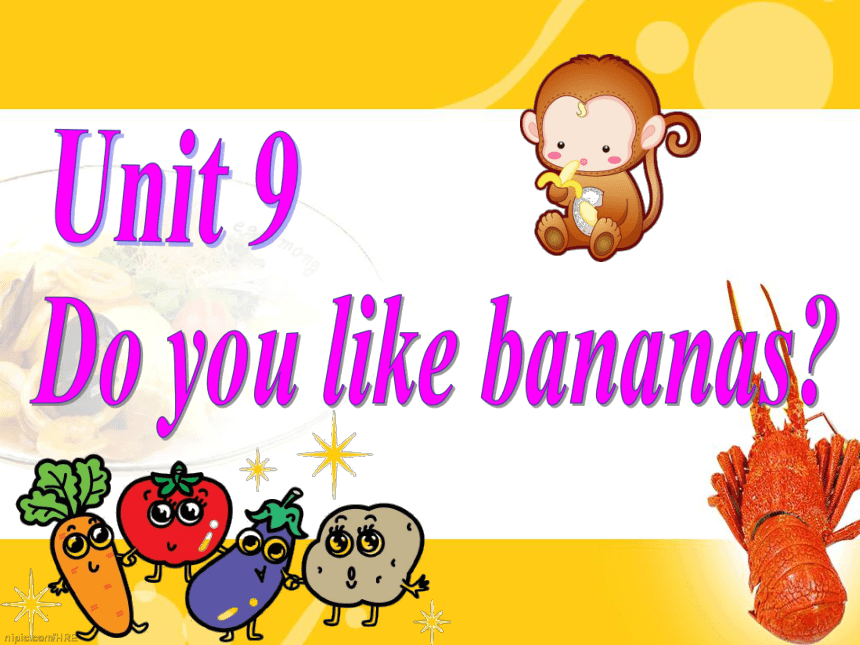
|
|
| 格式 | zip | ||
| 文件大小 | 3.7MB | ||
| 资源类型 | 教案 | ||
| 版本资源 | 鲁教版 | ||
| 科目 | 英语 | ||
| 更新时间 | 2017-09-23 00:00:00 | ||
图片预览

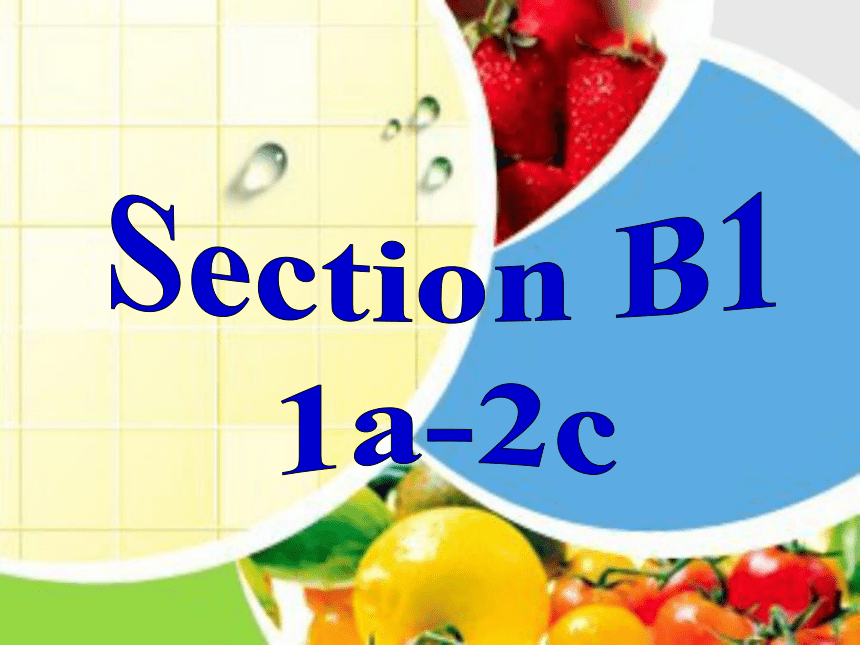
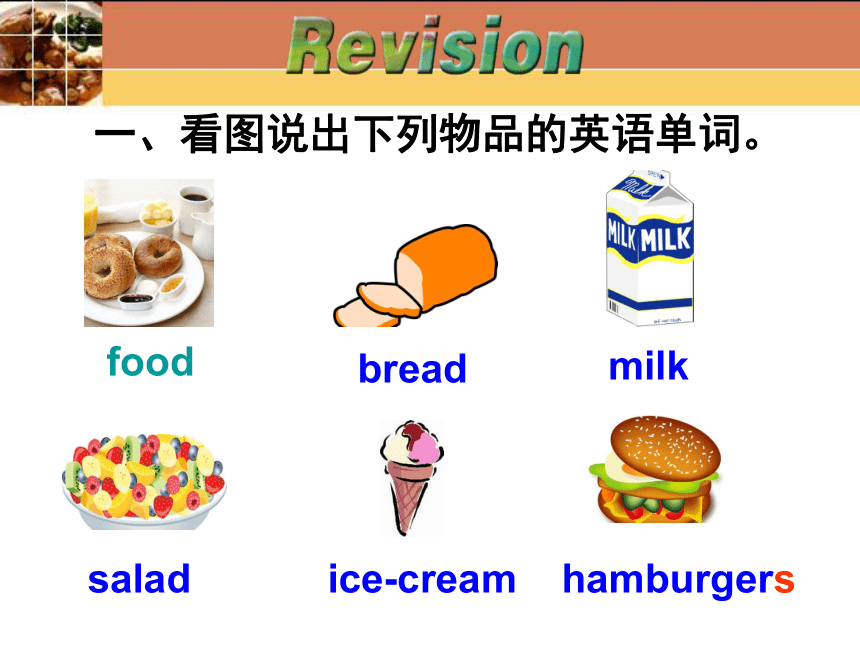
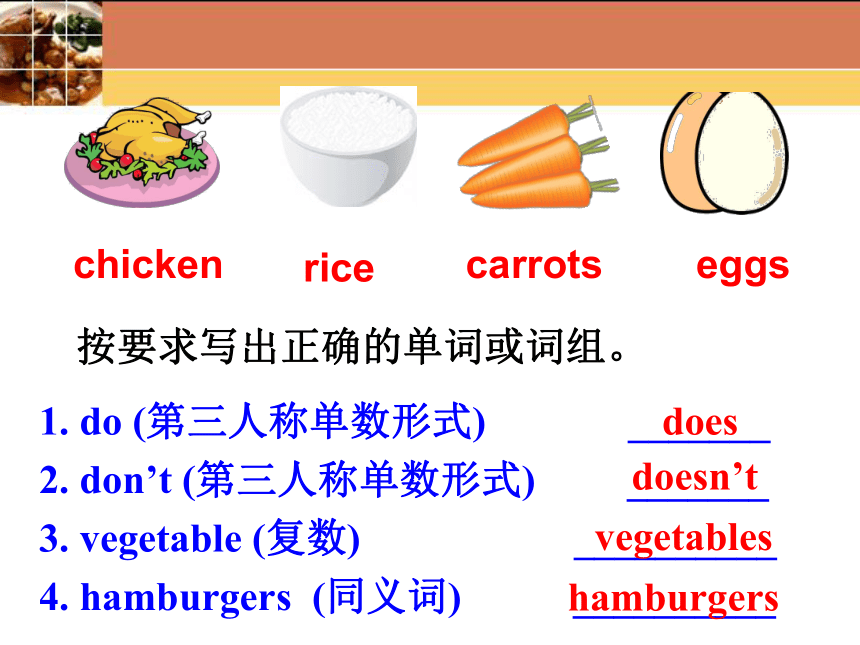
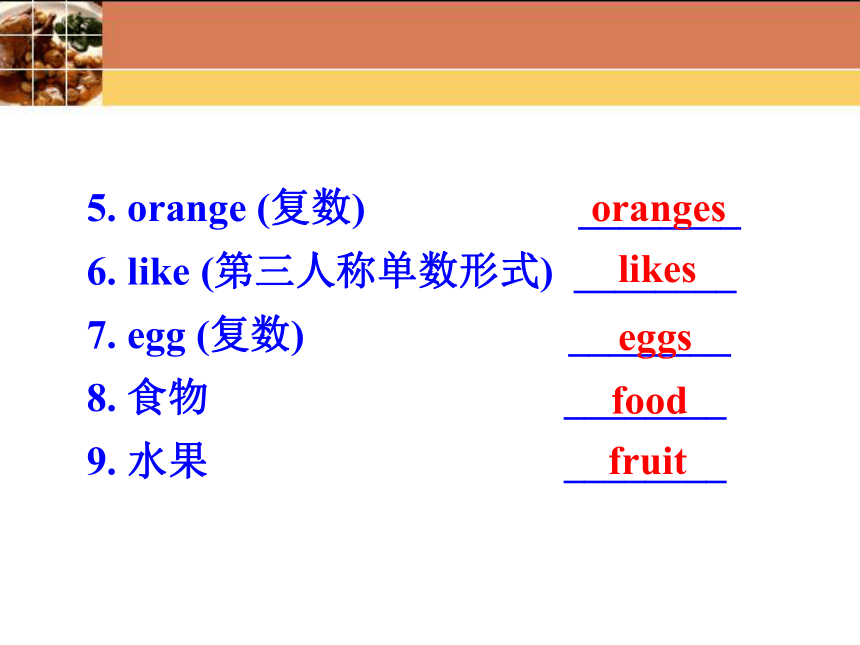

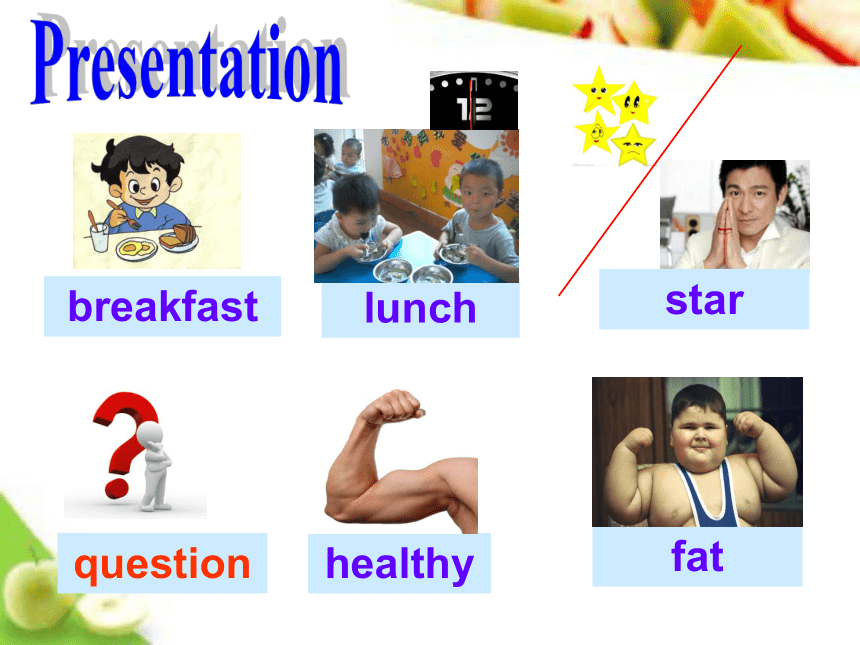
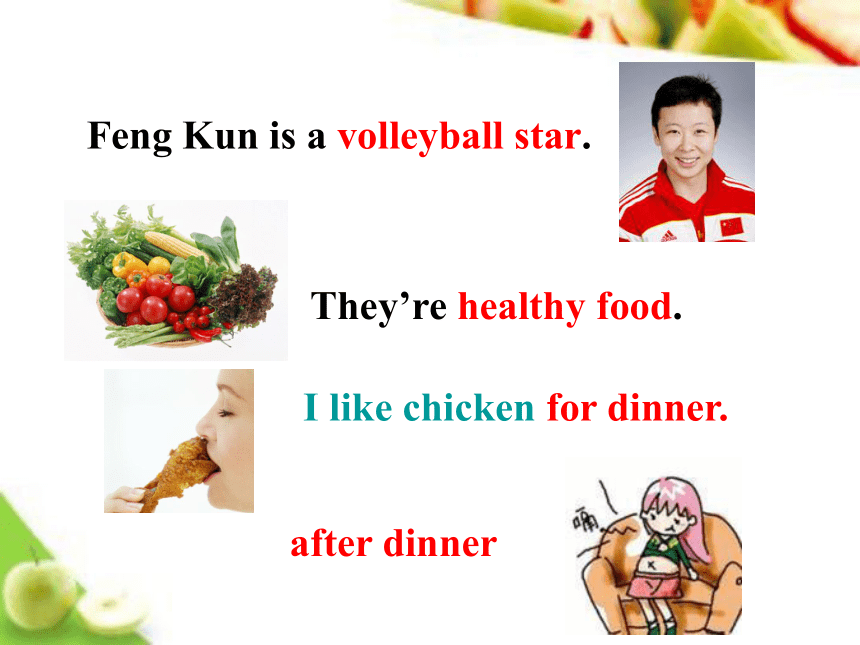
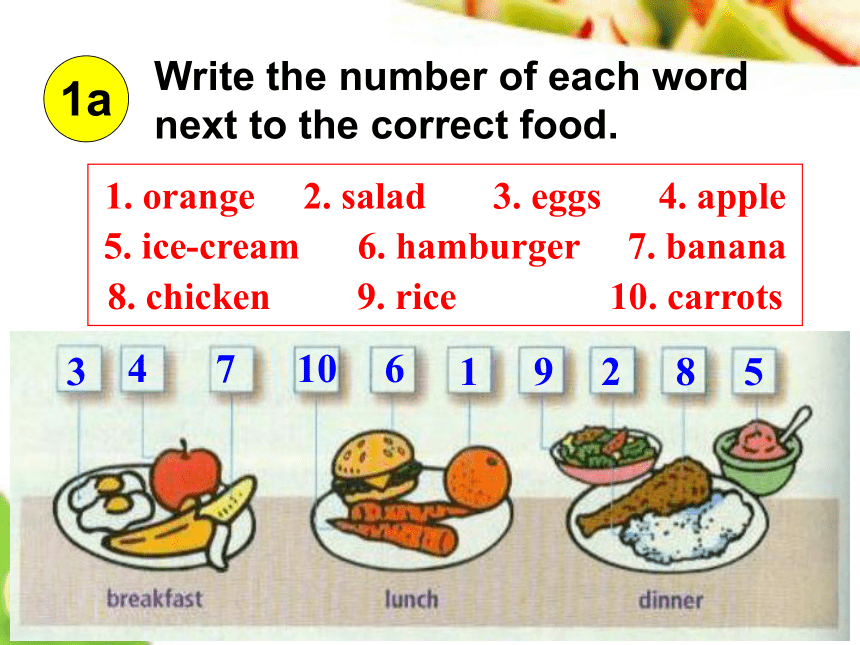
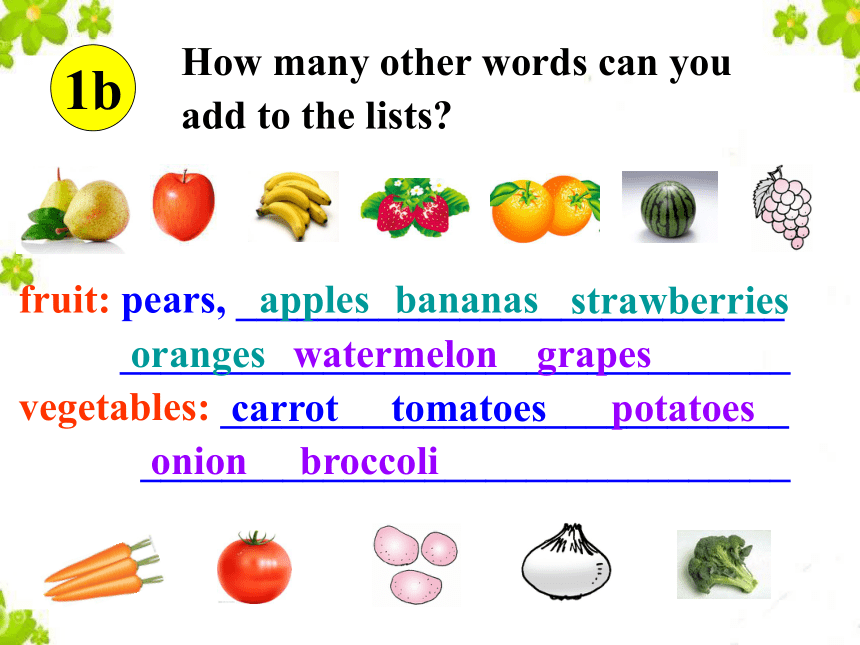
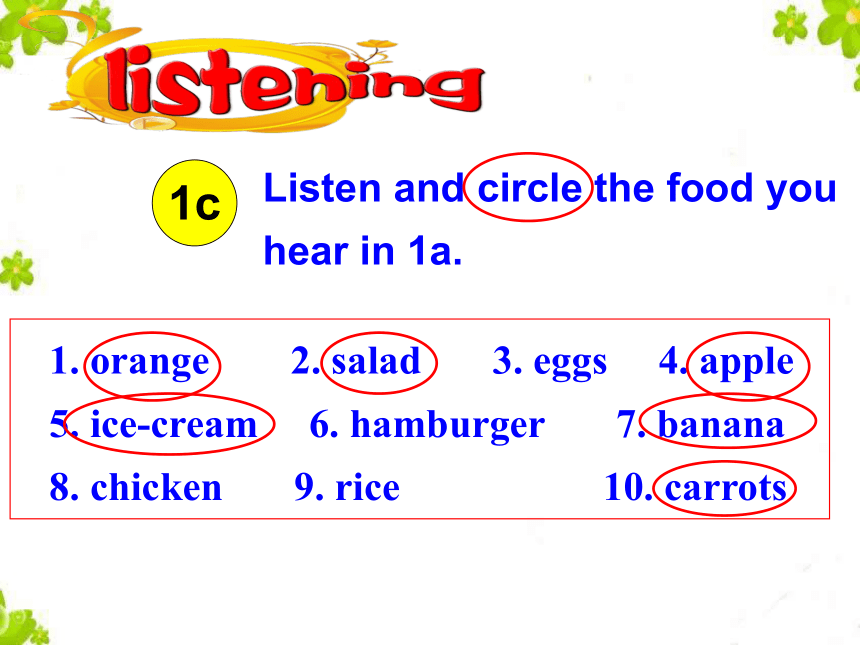
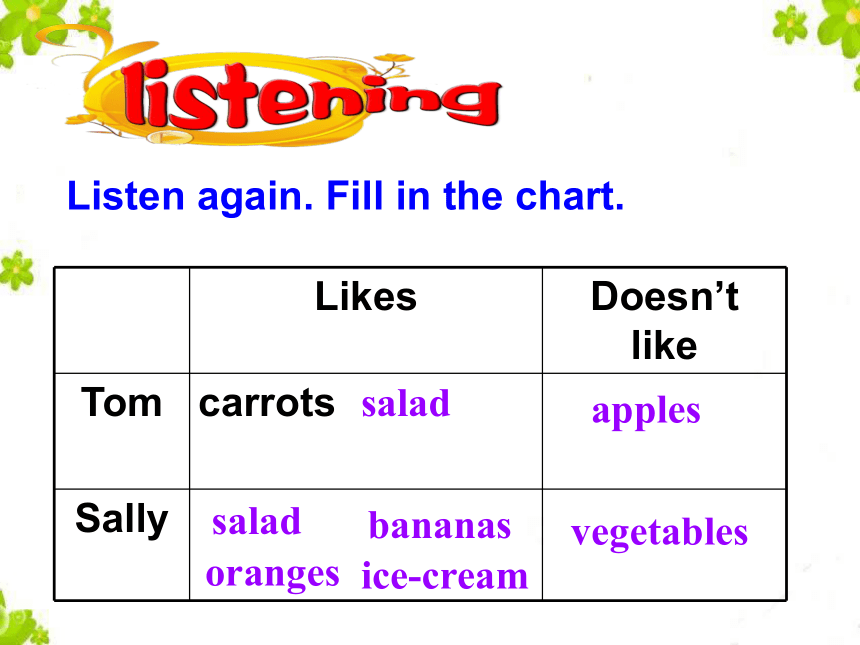
文档简介
课件38张PPT。Unit 9Do you like bananas?Section B1
1a-2cfood breadhamburgerssalad一、看图说出下列物品的英语单词。milk ice-creamchickenricecarrotseggs按要求写出正确的单词或词组。1. do (第三人称单数形式) _______
2. don’t (第三人称单数形式) _______
3. vegetable (复数) __________
4. hamburgers (同义词) __________doesn’tdoesvegetableshamburgers5. orange (复数) ________
6. like (第三人称单数形式) ________
7. egg (复数) ________
8. 食物 ________
9. 水果 ________orangeseggsfoodlikes fruitapplesbananas pearscarrots tomatoesvegetableseggs oranges milkbreadricefoodfruitice-creamsaladchickenhamburgers strawberries将下列单词按要求分类。milk, orange, food, bread, egg, carrot, vegetable, rice, apple, ice-cream, strawberry, chicken, banana, salad, pear, bread, tomato, fruitquestionhealthyfatbreakfastPresentationstarlunchFeng Kun is a volleyball star.They’re healthy food.I like chicken for dinner.after dinner1. orange 2. salad 3. eggs 4. apple
5. ice-cream 6. hamburger 7. banana
8. chicken 9. rice 10. carrots3471aWrite the number of each word next to the correct food.10618259fruit: pears, ___________________________
_________________________________
vegetables: ____________________________
________________________________strawberriesapplesbananas1bHow many other words can you add to the lists? orangeswatermelongrapescarrottomatoespotatoesonionbroccoliListen and circle the food you hear in 1a. 1c 1. orange 2. salad 3. eggs 4. apple
5. ice-cream 6. hamburger 7. banana
8. chicken 9. rice 10. carrotsListen again. Fill in the chart. saladapplessaladbananasorangesvegetablesice-cream1eDoes Tom like carrots?Yes, he does.Does Tom like …?…Ask and answer questions about what Sally and Tom like and don’t like.PairworkDoes Sally like salad?Yes, she does.Does Sally like …?…2aWhich food do you think is healthy? Check (√) Yes, Maybe or No.√√√√√√Read the magazine article and circle the food words. 2b阅读指导:
首先,快速阅读本文,圈出食物名称的词汇;然后,精读短文,查找对话中表达好恶的句子,I like / love …与 I don’t like … /… no, they’re not healthy可知,将这些食物按好恶分类。
最后,用 Cindy / She likes …和 Cindy / She doesn’t like … 写出完整的句子。 Sports Star Eats Well!
David asks about the volleyball star, Cindy Smith, about her eating habits.
David: Hello, Cindy. What do you like for breakfast?
Cindy: I love fruit. I think it’s healthy.David: OK. So what fruit do you like? Do you like bananas?
Cindy: Well, I don’t like bananas. But I like oranges and apples.
David: What about lunch? Do you like salad?
Cindy: Yes, I really like it.
David: Hmm … and do you like hamburgers for dinner?Cindy: Oh, no, they’re not healthy. I like chicken for dinner.
David: OK. well, one last question — do you eat ice-cream after dinner?
Cindy: Err … I like ice-cream … but I don’t eat it. I don’t want to be fat. Cindy likes healthy food.
1. Cindy _______________________________
2. She _________________________________
3. She _________________________________
4. Cindy doesn’t ________________________
5. She doesn’t __________________________2cWrite five sentences about Cindy’s eating habits. Cindy likes healthy food.
1. Cindy _______________________________
2. She _________________________________
3. She _________________________________
4. Cindy doesn’t ________________________
5. She doesn’t __________________________Let’s check the questions. loves fruit.eat ice-cream after dinner.likes oranges and bananas.likes salad for lunch. like hamburgers for dinner.1. Sports star eats well! 体育明星吃得好!
句中的well用作副词,意为 “好”,用来修饰动词eat,意为“吃得好”。例如:
Peter eats very well at school.
彼得在学校里吃得很好。ExplanationTom likes basketball. He plays it very well.
汤姆喜欢篮球。他打得很好。 (1) good 是形容词,常置于名词之前,表示 “好的”。
e.g. Mr. Wang is a good teacher.
王老师是一位好老师。
(2) well用作副词,常置于动词之后,表示 程度“好;满意地”;用作形容词指“身 体好”。well 与 good The boy can swim very well.
这个男孩游泳游得很好。
— How is your father? 你的爸爸挺好吗?
— He’s very well. 他很好的。
2. eating habits 饮食习惯
eating habits 意为“饮食习惯”,其中eating是动名词作定语,修饰habits。类似短语还有: swimming pool 游泳池
reading room 阅览室 3. healthy 是形容词“健康的”,其名词形式为health“健康”。例如:
Tom eats lots of healthy food.
汤姆吃许多健康的食品。
It’s good for your health.
这对你的健康有好处。4. I like chicken for dinner.
晚饭我喜欢鸡肉。
“like + 食品名词 + for + 某餐”表示“某人 喜欢吃什么”。如: — What do you like for dinner?
晚饭你喜欢吃什么?
— I like vegetables and rice for dinner.
午饭我喜欢蔬菜和米饭。
She likes bread and milk for breakfast.
早餐他喜欢牛奶和面包。
5. for 作介词,表示“对于……,就……而 言”。for breakfast / lunch / dinner
就早餐/午餐而言6. I don’t want to be fat. 我不想变胖。
want 用作动词,意为“要;想要”,其常见 用法如下: want sth.
想要某物
want to do sth.
想要去做某事
want sb. to do sth.
想要某人去做某事I want some rice.
我想要些米饭。
She wants to ask a question.
她想问个问题。
Jack wants me to go to school with him.
杰克想让我和他一起去上学。 7. really adv. 真正地 主要用于强调与事实或现实不相违背,也可表示不快、惊奇或某种含蓄的怀疑。It’s really cold today.
今天可真冷。Did he really say so?
他真的那样说吗?8. question n. 问题 no question 毫无疑问
answer the question 回答这个问题通常指用口头或书面提出来要求回答或有待讨论解决的问题。After answering his question, she asked back.
回答他的问题之后,她反问他。 一、选词填空。
1. Dave’s brother plays soccer very _____.
2. For __________, what does she like?
3. Ice-cream is not good. Let’s eat some _______ food.wellbreakfasthealthybreakfast, eat, health, well, real Exercises4. I’m hungry (饥饿的). Can I ____ some bread?
5. — Do you like hamburgers?
— No. I don’t _______ like it. eatreally二、句型转换
He eats chicken every day.
(改为一般疑问句)
______ he ______ chicken every day? Does eat 2. Tom has hamburgers for dinner.
(改为否定句)
Tom _______ _____ hamburgers for dinner.
3. I have two eggs for breakfast.
(对划线部分提问)
_____ _____ you ______ for breakfast?
4. She speaks a good English. (改为同义句)
She speaks English ______. doesn’t haveWhat do havewell5. Does your mother like rice for lunch?
(作否定回答)
______, ______ ______. Yes she does三、完成句子
1. 午饭,我弟弟喜欢吃汉堡包。
My brother _____ hamburgers ____ ______.
2. 我们不认识这位体育明星。
We don’t know this ______ ______.likes for lunchsports star3. 现在多数女孩都不想变胖。
Now most girls don’t _____ ___ ___ ____.
4. 早饭你们喜欢吃什么?
_____ ____ they ____ for breakfast?
5. 我的饮食习惯很好。
My ______ ______ is good. want to be fatWhat do likeeating habit 1. 分类复习所学的有关食物的词汇,并强化记忆。
2. 用下列句型就你自己的饮食习惯写五到七个句子。
I like …
I don’t like …
I …
I don’t … GoodbyeThank you!
1a-2cfood breadhamburgerssalad一、看图说出下列物品的英语单词。milk ice-creamchickenricecarrotseggs按要求写出正确的单词或词组。1. do (第三人称单数形式) _______
2. don’t (第三人称单数形式) _______
3. vegetable (复数) __________
4. hamburgers (同义词) __________doesn’tdoesvegetableshamburgers5. orange (复数) ________
6. like (第三人称单数形式) ________
7. egg (复数) ________
8. 食物 ________
9. 水果 ________orangeseggsfoodlikes fruitapplesbananas pearscarrots tomatoesvegetableseggs oranges milkbreadricefoodfruitice-creamsaladchickenhamburgers strawberries将下列单词按要求分类。milk, orange, food, bread, egg, carrot, vegetable, rice, apple, ice-cream, strawberry, chicken, banana, salad, pear, bread, tomato, fruitquestionhealthyfatbreakfastPresentationstarlunchFeng Kun is a volleyball star.They’re healthy food.I like chicken for dinner.after dinner1. orange 2. salad 3. eggs 4. apple
5. ice-cream 6. hamburger 7. banana
8. chicken 9. rice 10. carrots3471aWrite the number of each word next to the correct food.10618259fruit: pears, ___________________________
_________________________________
vegetables: ____________________________
________________________________strawberriesapplesbananas1bHow many other words can you add to the lists? orangeswatermelongrapescarrottomatoespotatoesonionbroccoliListen and circle the food you hear in 1a. 1c 1. orange 2. salad 3. eggs 4. apple
5. ice-cream 6. hamburger 7. banana
8. chicken 9. rice 10. carrotsListen again. Fill in the chart. saladapplessaladbananasorangesvegetablesice-cream1eDoes Tom like carrots?Yes, he does.Does Tom like …?…Ask and answer questions about what Sally and Tom like and don’t like.PairworkDoes Sally like salad?Yes, she does.Does Sally like …?…2aWhich food do you think is healthy? Check (√) Yes, Maybe or No.√√√√√√Read the magazine article and circle the food words. 2b阅读指导:
首先,快速阅读本文,圈出食物名称的词汇;然后,精读短文,查找对话中表达好恶的句子,I like / love …与 I don’t like … /… no, they’re not healthy可知,将这些食物按好恶分类。
最后,用 Cindy / She likes …和 Cindy / She doesn’t like … 写出完整的句子。 Sports Star Eats Well!
David asks about the volleyball star, Cindy Smith, about her eating habits.
David: Hello, Cindy. What do you like for breakfast?
Cindy: I love fruit. I think it’s healthy.David: OK. So what fruit do you like? Do you like bananas?
Cindy: Well, I don’t like bananas. But I like oranges and apples.
David: What about lunch? Do you like salad?
Cindy: Yes, I really like it.
David: Hmm … and do you like hamburgers for dinner?Cindy: Oh, no, they’re not healthy. I like chicken for dinner.
David: OK. well, one last question — do you eat ice-cream after dinner?
Cindy: Err … I like ice-cream … but I don’t eat it. I don’t want to be fat. Cindy likes healthy food.
1. Cindy _______________________________
2. She _________________________________
3. She _________________________________
4. Cindy doesn’t ________________________
5. She doesn’t __________________________2cWrite five sentences about Cindy’s eating habits. Cindy likes healthy food.
1. Cindy _______________________________
2. She _________________________________
3. She _________________________________
4. Cindy doesn’t ________________________
5. She doesn’t __________________________Let’s check the questions. loves fruit.eat ice-cream after dinner.likes oranges and bananas.likes salad for lunch. like hamburgers for dinner.1. Sports star eats well! 体育明星吃得好!
句中的well用作副词,意为 “好”,用来修饰动词eat,意为“吃得好”。例如:
Peter eats very well at school.
彼得在学校里吃得很好。ExplanationTom likes basketball. He plays it very well.
汤姆喜欢篮球。他打得很好。 (1) good 是形容词,常置于名词之前,表示 “好的”。
e.g. Mr. Wang is a good teacher.
王老师是一位好老师。
(2) well用作副词,常置于动词之后,表示 程度“好;满意地”;用作形容词指“身 体好”。well 与 good The boy can swim very well.
这个男孩游泳游得很好。
— How is your father? 你的爸爸挺好吗?
— He’s very well. 他很好的。
2. eating habits 饮食习惯
eating habits 意为“饮食习惯”,其中eating是动名词作定语,修饰habits。类似短语还有: swimming pool 游泳池
reading room 阅览室 3. healthy 是形容词“健康的”,其名词形式为health“健康”。例如:
Tom eats lots of healthy food.
汤姆吃许多健康的食品。
It’s good for your health.
这对你的健康有好处。4. I like chicken for dinner.
晚饭我喜欢鸡肉。
“like + 食品名词 + for + 某餐”表示“某人 喜欢吃什么”。如: — What do you like for dinner?
晚饭你喜欢吃什么?
— I like vegetables and rice for dinner.
午饭我喜欢蔬菜和米饭。
She likes bread and milk for breakfast.
早餐他喜欢牛奶和面包。
5. for 作介词,表示“对于……,就……而 言”。for breakfast / lunch / dinner
就早餐/午餐而言6. I don’t want to be fat. 我不想变胖。
want 用作动词,意为“要;想要”,其常见 用法如下: want sth.
想要某物
want to do sth.
想要去做某事
want sb. to do sth.
想要某人去做某事I want some rice.
我想要些米饭。
She wants to ask a question.
她想问个问题。
Jack wants me to go to school with him.
杰克想让我和他一起去上学。 7. really adv. 真正地 主要用于强调与事实或现实不相违背,也可表示不快、惊奇或某种含蓄的怀疑。It’s really cold today.
今天可真冷。Did he really say so?
他真的那样说吗?8. question n. 问题 no question 毫无疑问
answer the question 回答这个问题通常指用口头或书面提出来要求回答或有待讨论解决的问题。After answering his question, she asked back.
回答他的问题之后,她反问他。 一、选词填空。
1. Dave’s brother plays soccer very _____.
2. For __________, what does she like?
3. Ice-cream is not good. Let’s eat some _______ food.wellbreakfasthealthybreakfast, eat, health, well, real Exercises4. I’m hungry (饥饿的). Can I ____ some bread?
5. — Do you like hamburgers?
— No. I don’t _______ like it. eatreally二、句型转换
He eats chicken every day.
(改为一般疑问句)
______ he ______ chicken every day? Does eat 2. Tom has hamburgers for dinner.
(改为否定句)
Tom _______ _____ hamburgers for dinner.
3. I have two eggs for breakfast.
(对划线部分提问)
_____ _____ you ______ for breakfast?
4. She speaks a good English. (改为同义句)
She speaks English ______. doesn’t haveWhat do havewell5. Does your mother like rice for lunch?
(作否定回答)
______, ______ ______. Yes she does三、完成句子
1. 午饭,我弟弟喜欢吃汉堡包。
My brother _____ hamburgers ____ ______.
2. 我们不认识这位体育明星。
We don’t know this ______ ______.likes for lunchsports star3. 现在多数女孩都不想变胖。
Now most girls don’t _____ ___ ___ ____.
4. 早饭你们喜欢吃什么?
_____ ____ they ____ for breakfast?
5. 我的饮食习惯很好。
My ______ ______ is good. want to be fatWhat do likeeating habit 1. 分类复习所学的有关食物的词汇,并强化记忆。
2. 用下列句型就你自己的饮食习惯写五到七个句子。
I like …
I don’t like …
I …
I don’t … GoodbyeThank you!
同课章节目录
- Unit 1 Good morning
- Section A
- Section B
- Unit 2 What's this in English?
- Section A
- Section B
- Unit 3 What color is it?
- Section A
- Section B
- Unit 4 My name's is Gina
- Section A
- Section B
- Unit 5 This is my siste
- Section A
- Section B
- Unit 6 Is this your pencil?
- Section A
- Section B
- Unit 7 Where's my schoolbag?
- Section A
- Section B
- Unit 8 Do you have a soccer ball?
- Sectioan A
- Sectioan B
- Unit 9 Do you like bananas?
- Section A
- Section B
- Unit 10 How much are these socks?
- Section A
- Section B
